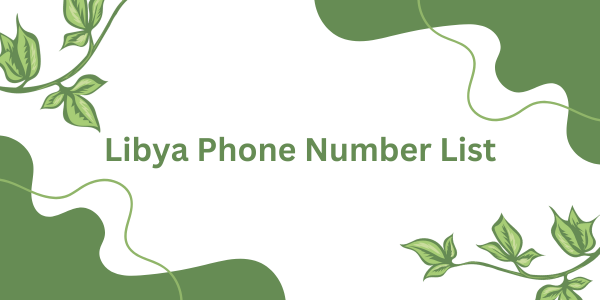Acquiring or using a telephone number list in libya. Much more so one with 3 million entries. Requires deep knowledge in terms of privacy laws and regulatory framework. Coupled with best ethical practices. While libya has not established a comprehensive. Standardized data protection law comparable to the general data protection regulation in the european union or similar regulations elsewhere. Businesses must be very circumspect and take all responsible actions in the ways they collect and use phone numbers for marketing or business purposes.
Due to the absence of formal laws related to data protection. A combination Libya Phone Number List of international guidelines will be presented. Along with local practices. In order to note major considerations and avoid ethical pitfalls.
Legal considerations in libya
While there is no currently applicable national data protection law in libya. Business enterprises operating within the country will still be cautious and show respect for some principles in processing personal data like phone numbers. Generally. Points to be noted are as follows:
1. International privacy guidelines
Libya is not bound by the gdpr. In any case. International organizations operating in or with the libyan consumer market are expected to apply the global standard for data protection. For instance. Organizations that are headquartered in the eu. Or that form part of an international group. Must be informed that due to the extraterritorial effect of the gdpr. Automatically any processing regarding information of a european Buy Email Database List citizen means that the said processing becomes automatically subject to the gdpr.
Thirdly. A company may be under an obligation to adhere to international best practices concerning data protection: obtaining informed consent. Limiting the volume of information acquired and affording rights of access or erasure for users in relation to their personal data.
2. Telecommunication regulations
The telecom industry in libya is overseen and regulated by libyan post. Telecommunications and information technology company. Which controls most of the aspects of the telecom services within the country. While telemarketing is not regulated as stringently in libya as it is in most western countries. Telemarketing through phone numbers remains quite sensitive. There is no apparent national “do-not-call” list in libya. But businesses should understand that unsolicited calls or messages might be poorly accepted by customers and could harm the company’s reputation.
While the practice is not so strictly regulated as it is in the eu and the us. Libyan companies still need to make sure that there is consent on file before contacting individuals for marketing purposes. Otherwise. This could lead to adverse customer reaction and a loss of business credibility.
Ethical and practical issues
In the absence of a national legislation on data protection. It means that businesses have to make extra efforts to ensure that their practices meet minimum international ethical thresholds of respect for privacy.
1. Consent and transparency
The best possible approach to obtaining telephone numbers and retaining data on the use of such is informed consent. It has to be explicitly provided by individuals. Whether for direct marketing. Selling. Or service purposes. This may be realized through:
Opt-in forms: phone numbers are to be collected either from Bulk Database official websites or through contacting customers directly. Thereby allowing them to know what the collected data will be used for.
Marketing campaigns: after that
Customers can be given the opportunity to subscribe or opt-in in return for marketing messages and offers.
The companies should always keep their customers informed about the use of their data and who is going to share it. This will help gain customer trust for the company.
Data security and privacy
Though there is no stringent
data protection law in libya. A business that collects phone numbers should introduce a security mechanism. This will include measures to prevent data breach. Unauthorized access. And misuse. Proper encryption. Storage practices. And clear policies on access to the stored data are part of any worthwhile data management regime.


